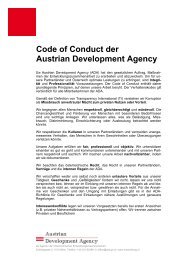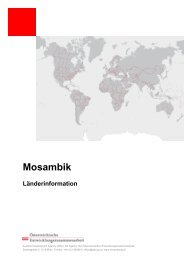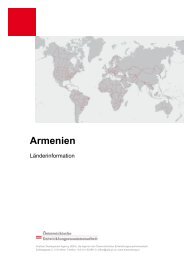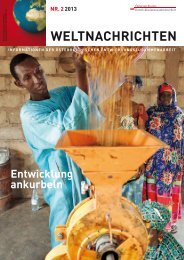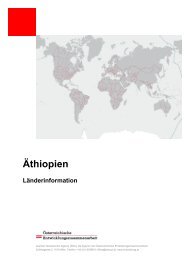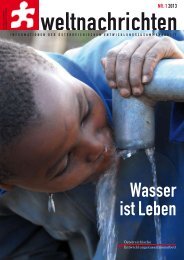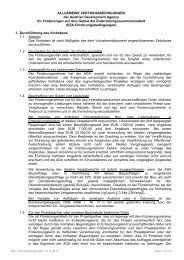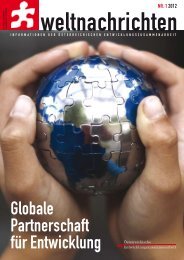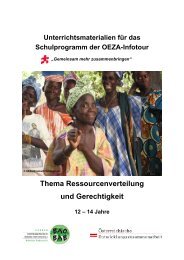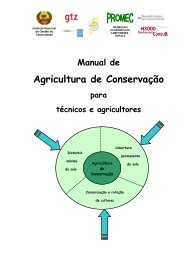Clarification of questions
Clarification of questions
Clarification of questions
Create successful ePaper yourself
Turn your PDF publications into a flip-book with our unique Google optimized e-Paper software.
<strong>Clarification</strong> <strong>of</strong> <strong>questions</strong> regarding<br />
Call for Proposals-Number: KOS 01/2011<br />
Higher KOS - Promoting Institutional Development in Higher Education and<br />
Research in Kosovo<br />
Question 1: Gibt es irgendeine Vorgabe zur Management-Struktur (vor Ort und in<br />
Österreich)?<br />
Answer 1: Regarding the question whether any specific management structure is<br />
foreseen by the Contracting Authority, the answer is that the extent and manner <strong>of</strong><br />
setting-up a management structure for the project is to be proposed by the applicant.<br />
Question 2: Ist es grundsätzlich möglich, bestehenden Staff an den beneficiary<br />
institutions für zusätzlichen Arbeitsaufwand (nicht für Teilnahme an Trainings etc.)<br />
finanziell zu entschädigen?<br />
Answer 2: Staff <strong>of</strong> the beneficiary institutions (MEST, universities etc.) may not<br />
receive any type <strong>of</strong> remuneration (i.e. honoraria or salaries) to “compensate<br />
additional workload” related to the project.<br />
A remuneration <strong>of</strong> staff <strong>of</strong> the beneficiary institutions may only be provided for shortterm<br />
assignments (e.g. where an expert provides specific input to a particular task).<br />
Such remuneration must be based on clearly defined services to be delivered based<br />
on clearly defined terms <strong>of</strong> reference. The procurement regulations as set out in the<br />
General Terms and Conditions <strong>of</strong> Contract <strong>of</strong> the Austrian Development Agency are<br />
to be respected in this context.<br />
Question 3: Zum Budget: Ist es möglich, Personalkosten innerhalb des Consortiums<br />
(betrifft v.a. interne ExpertInnentätigkeit) in Form von üblichen Tagsätzen<br />
abzurechnen (um die Administration des Projekts und den damit verbundenen<br />
Aufwand gering zu halten)?<br />
Answer 3: Costs for personnel <strong>of</strong> the grant beneficiary (i.e. staff employed by the<br />
main applicant or any other proposed consortium members) may only be budgeted<br />
and charged on the basis <strong>of</strong> proportional salary costs (depending on the percentage<br />
at which the respective staff is assigned to the project).<br />
Therefore, for personnel employed by the applicant no honoraria can be budgeted or<br />
charged. Honoraria can only be budgeted or charged for potential sub-contractors <strong>of</strong><br />
the grant beneficiary that are selected to provide specific services to the project that<br />
cannot be implemented by the applicant. Sub-contractors are to be identified in<br />
accordance with the procurement regulations as set out in the General Terms and<br />
Conditions <strong>of</strong> Contract <strong>of</strong> the Austrian Development Agency (“Allgemeine<br />
Vertragsbedingungen”).<br />
Question 4: Zu der Bibliotheks-Komponente: Es gab die Idee innerhalb des KAIPs<br />
ein "Library Network" zu fördern. Ist das realisiert worden und gibt es Ergebnisse auf<br />
denen aufgebaut werden kann?<br />
Answer 4: A “library network” has not been implemented in any <strong>of</strong> the predecessor<br />
programmes supported by the Austrian Development Agency in Kosovo.<br />
1
Question 5: Ist es grundsätzlich möglich, im Rahmen der Programmatic<br />
Partnerships einerseits Partnerinstitutionen aus anderen Ländern (außer Kosovo und<br />
Österreich) zu involvieren bzw. andererseits ExpertInnen aus anderen Ländern<br />
(außer Kosovo und Österreich) im Rahmen der Partnership zur Kooperation<br />
einzuladen?<br />
Answer 5: As regards the support to establishing programmatic partnerships<br />
between Kosovan higher education institutions and higher education institutions from<br />
other countries, it is referred to the document „Invitation to the Call for Proposals”<br />
where it is stated that the “Strategy Document” includes “possible activity lines”.<br />
These activity lines can however be adapted by applicants along the lines <strong>of</strong> their<br />
approaches/strategies with the aim to ensure best possible and high quality<br />
knowledge transfer.<br />
Question 6: On which basis will the administrator <strong>of</strong> the calls for “collaborative<br />
research projects” get reimbursed the project funds by the Austrian Development<br />
Agency?<br />
Answer 6: Conditions are laid down in the contractual arrangement, with reference<br />
to the ADA website link:<br />
http://www.entwicklung.at/funding-and-tenders/general-contractual-terms-andfunding-logos/en/<br />
Additional clarification:<br />
Assuming that the concerned tasks will be carried out by the Applicant himself (or a<br />
member <strong>of</strong> the Applicant, in case <strong>of</strong> a consortium), the funds for these tasks will be<br />
made available to the grant recipient (Applicant) directly by ADA.<br />
The grant recipient will receive a pre-financing instalment following signature <strong>of</strong> the<br />
grant agreement with ADA. Further instalments will be made by ADA based on actual<br />
expenditure rates during implementation and approval <strong>of</strong> the respective financial<br />
reports by the finance department <strong>of</strong> ADA.<br />
The costs for technical/management personnel <strong>of</strong> the grant beneficiary may be<br />
charged for in the project budget on the basis <strong>of</strong> proportional salary costs. The<br />
remuneration for staff <strong>of</strong> the Applicant (or a member <strong>of</strong> the Applicant, in case <strong>of</strong> a<br />
consortium) may, as a rule, not be fee-based.<br />
Typical administrative costs related to the implementation <strong>of</strong> such activities are<br />
covered by the “Projektbegleitentgelt (see the respective regulation as follows:<br />
http://www.entwicklung.at/uploads/media/PBE_Regelung_Foerderungen_100115.pdf<br />
).<br />
As regards supporting documentation:<br />
As a rule, original invoices/receipts must be submitted by grant recipients in<br />
the context <strong>of</strong> financial report submission every six months (due by 28<br />
February and 31 August <strong>of</strong> each calendar year for the reporting period ending<br />
on 30 June and 31 December respectively).<br />
However, the grant recipient may also propose (in the proposal) to conduct<br />
annual financial audits for project related expenditures incurred until 31<br />
December <strong>of</strong> the respective calendar year. In this case, the grant beneficiary<br />
does not have to submit original invoices to ADA, but an original hard copy <strong>of</strong><br />
the audit report. For further details please see Art. 4.6 <strong>of</strong> the General Terms<br />
and Conditions <strong>of</strong> Contract <strong>of</strong> the Austrian Development Agency under the<br />
above cited link. The costs for the financial audits have to be carried by the<br />
grant beneficiary (see regulation on “Projektbegleitentgelt”). The audit report<br />
2
will be due by 28 February <strong>of</strong> the calendar year following the reporting period<br />
ending on 31 December <strong>of</strong> the previous calendar year.<br />
Question 7: Gelten diese Regelungen auch für Research Grants, die an Dritte<br />
vergeben werden (über Calls for proposals) [reference is made to Answer 6 above]?<br />
Answer 7: The contractual conditions are, <strong>of</strong> course, applicable to the project as a<br />
whole (i.e. “PBE-Regelung”, financial reporting/auditing regulations etc.).<br />
In addition, as regards possible research grants, such grants may be included in the<br />
direct project budget. Therefore, such grants may not include administrative costs<br />
(e.g. proportional costs for an accountant employed by the beneficiary organisation).<br />
Equally, no lump sum payments may be included by beneficiary organisations in the<br />
budget <strong>of</strong> the research project to cover administrative costs.<br />
However, the grant beneficiary may charge for costs that may be required to<br />
implement the particular research project (e.g. room rental for the research team,<br />
material costs such as stationery, etc.). These costs must be accounted for through<br />
submission <strong>of</strong> original invoices/receipts (or alternatively, the research projects may<br />
be examined by the audit firm that will audit the whole project on an annual basis).<br />
The model/approach to the implementation <strong>of</strong> the grant scheme for the award <strong>of</strong><br />
research grants should be described in the proposal submitted by the Applicant to<br />
the extent possible at the stage <strong>of</strong> proposal submission.<br />
3



